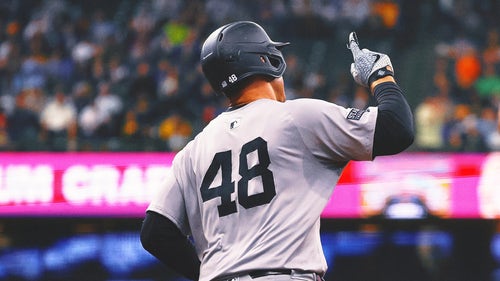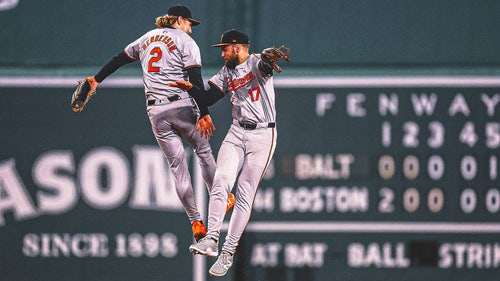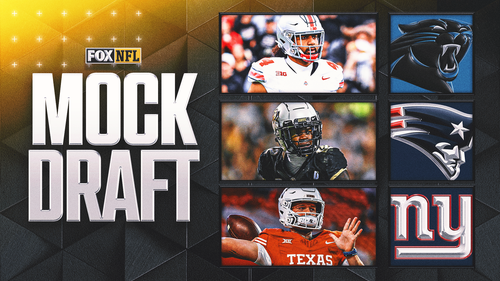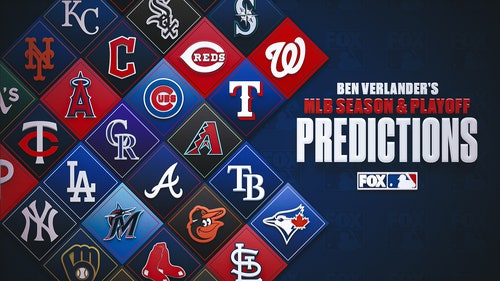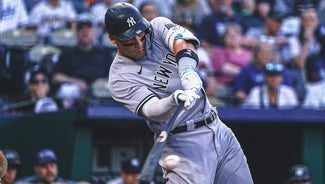
John Smoltz on MLB's wave of UCL injuries: 'It's all on management'
Earlier this week, I made it clear that I wholeheartedly believe the epidemic of injuries we have seen among MLB pitchers in recent years, and especially so far this season, is mainly due to how velocity and spin rate are overemphasized among all levels of the game in this current era, and any attempt to blame the pitch clock is a pathetic excuse.
But I never pitched in the big leagues. I'm only related to one of the best to ever do it in this era, who had his own thoughtful comments about this issue this week after a rehab start he made as he battles back from an injury himself. I also have the privilege of talking weekly with another legendary pitcher, lead MLB on FOX analyst John Smoltz.
Smoltz is extremely passionate about this subject and has been for years. His conviction was evident in our first "Saturdays with Smoltz" interview of 2024, most of which was spent on this very issue.
The Hall of Famer has thought and spoken a lot about this topic, even during his induction speech into Cooperstown 10 years ago. Below is a transcript of our conversation — it has been edited for clarity and length.
Verlander: There have been a slew of arm injuries around the league recently, including to stars like Spencer Strider, Shane Bieber, Framber Valdez and Gerrit Cole, and before that you got Shohei Ohtani, Jacob deGrom and several others. We've talked about this before, I'd love to dive in again and ask, what do you think is the reason behind this? Is it one particular thing you can point to? Is it a combination of things? If you had to pinpoint one thing, what would you say it is?
Smoltz: "I've been talking about this for 10 years, since it first started — the introduction of prioritizing high velocity, spin rate and analytics. And they may not admit it now, but their slogan 10 years ago was, 'We're going to put players in the best position to be successful, we're going to give them information, we're going to allow them to really utilize their skill set, and we're going to keep them healthy.' You've never heard anybody talk about that since. You haven't heard anybody talk about the root cause of these injuries. Everybody comes up with these nonsense excuses that mean nothing, and they get people to look the other way, when the root cause has been going on for 10 years.
"You cannot, you will not, stay healthy if you throw the ball as hard as these pitchers are throwing it and spin it as much as they are. Now, I do not blame the players whatsoever. This is the reward system they are in. I've been banging this drum for so long, and people are looking at this phenomenon like it just happened. The claim that the pitch clock is the reason for this is just nonsense. Anybody who has never put a ball in their hand that talks about something they don't know about is speaking nonsense on this issue. I will trust a pitcher who has thrown a million pitches, and when he tells me something's wrong with the baseball four years ago, I'll trust that because he's got the ball in his hand, and he says he can't get a real good grip.
"The root cause has always been there. You cannot throw a ball at 100 mph and sustain that five, seven or 10 years. People don't want to talk about it because they realize what they started 10 years ago has not been successful in the area of keeping guys healthy. But if I'm a young player today, my hands are tied. I've got to get drafted. I've got to get scouted. So, what am I supposed to do? I have to go to these entities that have definitely cracked the code on throwing the ball hard.
"We've mastered throwing the ball hard and spinning it really, really tight. But we've not even come close to being able to be honest and admit that these arm injuries are not linked to that.
"My era and the era before me, we were paid to play. We trained to have longevity, we trained for marathons. We've talked about this ad nauseam. And now all of a sudden, a few people come out and say the pitch clock is the reason guys are getting hurt? That's when I can't be quiet anymore. And that's why I'm passionate about this. All these young players have no choice. What are they supposed to do? If the reward system is X and you don't get punished for not pitching, then they're going to keep trying the same thing and ask for different results to happen.
"That's been my biggest passion since I've been out of the game. I talked about it in my Hall of Fame induction speech. I talk about it everywhere with youth sports. No one is listening, because the reward system and management has not made a necessary adjustment to address it. If they're not going to make that necessary adjustment, this will continue. Before we know it, we're going to run out of every great arm that has ever thrown a baseball."
Verlander: I agree that placing the majority of the blame for this on the pitch clock is more of a shortsighted conversation than the one that needs to be had. But do you think the pitch clock has maybe accelerated this trend to any degree, or do you think it's a nonfactor?
Smoltz: "In the scope of things, it's a 10%, maybe 20% factor, and some people just have not adapted. But here's the deal: Let's say, hypothetically, we let every pitcher throw it as hard as they can and take as long as they can to throw it. First of all, the games would be five hours long. Second of all, my bet would be zero chance these guys would stay healthy anyway.
"The reason the pitch clock came into play is because guys were taking so long to execute, and the game was suffocating. It was losing attendance and fans. So, when the pitch clock comes in — and the data shows guys weren't even getting to 18 seconds, the reason they shaved two seconds off the limit with runners on base is data showed it wasn't even a factor — and when three to five pitchers get out in front of it, they're telling you something that's about to happen that has no relevancy and data behind it.
"I get it, and I know these guys are in a tough spot. But the pitch clock is a small spoke to the wheel, while the root cause has been there for a decade. For the past eight years, this has been a trend in the wrong direction. Now all of a sudden, something new comes along and we want to blame it on that? Sorry, that does not hold water."
Verlander: So, John, this is the hardest question: What is the resolution? When I was in the minor leagues from 2013 to 2017, all pitchers would hear from the organization is how they need to be throwing 95 mph or harder. Teams are not even even drafting guys who can't at least touch that speed. We want them to throw it as hard as they can — ‘look at these analytics, spin it a little bit faster doing this.' And that's how they get up to the big leagues and have temporary success and then get paid. They're incentivized to do it, but then they're getting hurt doing it. So, what do we do?
Smoltz: "Inevitably, there will be a rule change that affects philosophy on this, meaning the game has changed, because rule changes have caused clubs to either decide to change the way they play or not. That's really what's going to end up happening because, nothing has really shown that this issue going to self-correct.
"This is all on management. I'm sorry, but it is. It's all on management and what they want out of their players. If they think that there's enough arms, that they can suffer the injury rate that's happening, they're going to keep doing it. But in my opinion, down the road, if there's a rule change that encourages the team to look at it and go, ‘Hey, we might have a competitive advantage if we ask our starters to go a little bit longer, so let's look at a different training mechanism.'
"If you're addicted to the outcome that has been what you've normally known forever with everything in life, if you're addicted to strikeouts, and an ERA around 1.9 to 2.1, and you only get to pitch when you're healthy, then that's what's going to happen. We have to get used to a higher ERA and more innings if that's the way they want to keep guys healthy and in the game.
"We know for a fact — doctors have made this absolutely a non-negotiable — you cannot throw the ball this hard for this long and be successful. These guys trained to learn to throw it harder. Now, they might have to train to learn to be in seventh gear, eighth gear. But that's the point. It all falls on the reward system."
Verlander: Around the time I was high school to college age is when it really became popular — just so everyone knows, throwing a ball overhand is not a natural arm movement — for people to start picking up weighted balls bigger than a baseball and start throwing them backwards, throwing them as hard as they can into a wall. And in my mind, without any statistics behind it, without knowing the science behind it or any of that, I knew this can't be good for for your arm in the future, it just can't be. And sure enough.
Smoltz: "There's no doubt. Again, if I were to just somehow be a young John Smoltz trying to make the big leagues today, I would not be able to be stubborn enough to throw it 94-93 mph where I was comfortable. I would be forced to throw 98-99 mph, which, based on my body composition — I mean I'm like Gumby anyway, things fall apart — I would not have a very long career.
"Here's the part I don't understand. Without naming entities and without calling people out, why is everybody so eager to crush the person who speaks truth? We're in this world where there's going to be people who are going to attack this conversation and say, "Well, John Smoltz is still living in the 1980s."
"No, I want the guys that are talented to be able to have as long a career as they possibly want. And that is just not happening today."
[Want great stories delivered right to your inbox? Create or log in to your FOX Sports account, follow leagues, teams and players to receive a personalized newsletter daily.]







































































































































